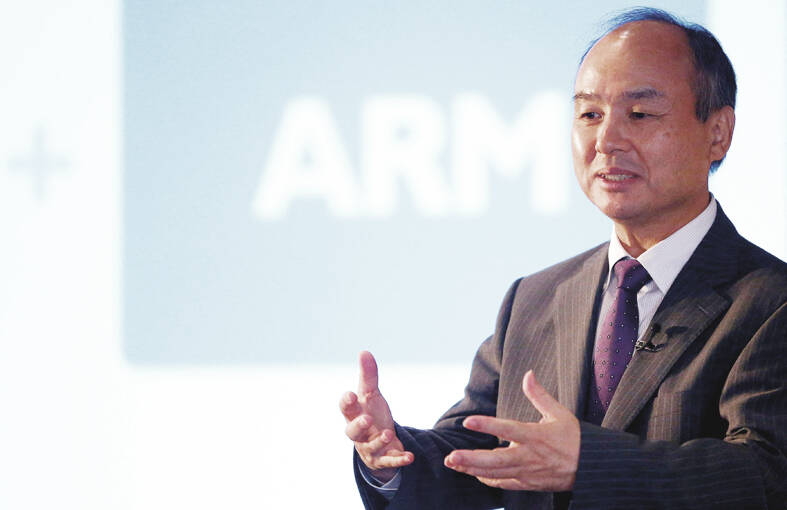Softbank Group Corp is moving to sell the majority of its stake in Chinese Internet giant Alibaba Group Holding Ltd (阿里巴巴), the Financial Times reported, the latest sign of long-time China investors lowering their exposure.
The Japanese technology investor has sold more than US$7 billion in Alibaba shares this year through prepaid forward contracts, after selling US$29 billion last year, the newspaper said.
The contracts give Softbank the option to buy the shares back, but the group has settled previous deals by handing over the stock, the Times reported.

Photo: Reuters
Pummeled by losses on its start-up bets, Softbank has said it would prioritize financial discipline before seeking the right time to go on the offensive with investments.
Investors are also speculating if the company might launch another buyback program.
Alibaba shares fell as much as 5.2 percent in Hong Kong yesterday, erasing about US$13 billion of market value. Softbank shares were little changed in Tokyo after dropping about 8 percent this year.
The sales are likely to reduce the Japanese conglomerate’s ownership of Alibaba to less than 4 percent, the paper said, citing its analysis of regulatory filings.
That is down from about a 14.6 percent stake the company said it was slated to hold as of the end of September last year. Softbank once owned about one-third of the company spanning from an early US$20 million investment in one of venture capital’s most famous bets.
“We think progress in the monetization of asset holdings would boost the chances of a buyback announcement,” Citibank analyst Mitsunobu Tsuruo said.
Alibaba, along with other technology companies, has come under intense scrutiny from the Chinese government in recent years, and its shares have tumbled.
The online commerce leader last month said it plans to split its US$240 billion empire into six units to raise funds individually and explore initial public offerings.
Softbank, once one of Silicon Valley’s largest investors, has shouldered billions of US dollars of losses on its Vision Fund, which had lifted valuations in start-ups worldwide with its large bets on hundreds of fledgling companies.
The Vision Fund unit last year cut staff as it stopped chasing new investments.
Softbank this week said it plans to sell early-stage venture capital arm Softbank Ventures Asia Corp, one of the avenues by which it scouted promising start-ups.
Softbank founder and CEO Masayoshi Son has said he wants to focus on a planned listing of chip design unit Arm Ltd later this year and make the debut “the biggest” in the history of the chip industry.
The relisting of Arm, which had traded on the London exchange prior to Softbank’s US$32 billion acquisition in 2016, is expected to be a windfall for the world’s biggest technology investor.

Intel Corp chief executive officer Lip-Bu Tan (陳立武) is expected to meet with Taiwanese suppliers next month in conjunction with the opening of the Computex Taipei trade show, supply chain sources said on Monday. The visit, the first for Tan to Taiwan since assuming his new post last month, would be aimed at enhancing Intel’s ties with suppliers in Taiwan as he attempts to help turn around the struggling US chipmaker, the sources said. Tan is to hold a banquet to celebrate Intel’s 40-year presence in Taiwan before Computex opens on May 20 and invite dozens of Taiwanese suppliers to exchange views

Application-specific integrated circuit designer Faraday Technology Corp (智原) yesterday said that although revenue this quarter would decline 30 percent from last quarter, it retained its full-year forecast of revenue growth of 100 percent. The company attributed the quarterly drop to a slowdown in customers’ production of chips using Faraday’s advanced packaging technology. The company is still confident about its revenue growth this year, given its strong “design-win” — or the projects it won to help customers design their chips, Faraday president Steve Wang (王國雍) told an online earnings conference. “The design-win this year is better than we expected. We believe we will win

Chizuko Kimura has become the first female sushi chef in the world to win a Michelin star, fulfilling a promise she made to her dying husband to continue his legacy. The 54-year-old Japanese chef regained the Michelin star her late husband, Shunei Kimura, won three years ago for their Sushi Shunei restaurant in Paris. For Shunei Kimura, the star was a dream come true. However, the joy was short-lived. He died from cancer just three months later in June 2022. He was 65. The following year, the restaurant in the heart of Montmartre lost its star rating. Chizuko Kimura insisted that the new star is still down

While China’s leaders use their economic and political might to fight US President Donald Trump’s trade war “to the end,” its army of social media soldiers are embarking on a more humorous campaign online. Trump’s tariff blitz has seen Washington and Beijing impose eye-watering duties on imports from the other, fanning a standoff between the economic superpowers that has sparked global recession fears and sent markets into a tailspin. Trump says his policy is a response to years of being “ripped off” by other countries and aims to bring manufacturing to the US, forcing companies to employ US workers. However, China’s online warriors